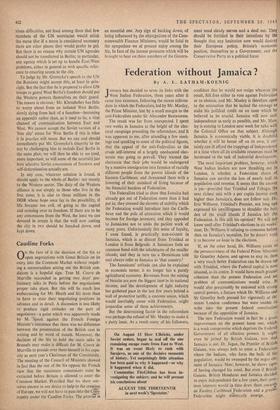Federation without Jamaica ?
By A. L. LATHAM-KOENIG JAMAICA has decided to sever its links with the West Indian Federation, three years after it came into existence, following the recent referen- dum in which the Federalists, led by Mr. Manley, the Prime Minister, lost by a small margin to the anti-Federalists under Sir Alexander Bustamente.
The result was far from unexpected. I spent two weeks in Jamaica at the height of the elec- toral campaign preceding the referendum, and it was apparent to me, after attending a few meet- ings and speaking to some of the political figures, that the appeal of the anti-Federalists to the crude self-interest of a largely uneducated elec- torate was going to prevail. They warned the electorate that their jobs would be endangered by a massive immigration into Jamaica of racially different people from the poorer islands of the Eastern Caribbean; and threatened them with a lowering of their standard of living because of the financial burdens of Federation.
The Federalists tried to show that Jamaica had already got out of Federation more than it had put in; they stressed the element of stability which the Federation would introduee into the Carib- bean and the pole of attraction which it would become for foreign investors; and they appealed to Jamaicans not to undo the patient work of many years. Unfortunately this sense of loyalty, I soon found, is practically non-existent in Jamaica, which is as distant from Trinidad as London is from Belgrade. A Jamaican feels no common bond with the inhabitants of the smaller islands; and they in turn (as a Dominican told me) always refer to Jamaica as 'that country.'
The Jamaicans' attitude can also be explained in economic terms; it no longer has a purely agricultural economy. Revenues from the mining of bauxite are now the biggest item' in its national income, and the development of light industry has gathered pace in the last few years behind a wall of protective tariffs; a customs union, which would inevitably come with Federation, might jeopardise some of these achievements.
But the determining factor in the referendum was perhaps the refusal of Mr. Manley to make it a party issue. As a result many of his followers, confident that he would not resign whatever th result, felt free either to vote against Federation or to abstain; and Mr. Manley is therefore open to the accusation that he lacked the courage to stake his political credit on an issue which he believed to be crucial. Jamaica will now seek independence as early as possible, and Mr. Man- Icy is coming to London next week for talks with the Colonial Office on that subject. Although Jamaica is economically viable, it is doubtful whether it will be better off on its own; it cer- tainly can ill afford the trappings of independence at a time when all its available resources must be harnessed to the task of industrial development.
The most important problem, however, ‘N hid] West Indian leaders are now thrashing out .0 London, is whether a Federation shorn of Jamaica can survive the loss of nearly half it S, population and revenue. It seems that the answer is yes—provided that Trinidad and Tobago, the next richest unit with a per capita income even higher than Jamaica's, does not follow suit. Dr. Eric Williams, Trinidad's Premier, not long ago expressed his 'Unwillingness to shoulder the but den of the small islands if Jamaica left the. Federation. Is this still his opinion? We will peAt know until after Trinidad's elections in six weeks' time; Dr. Williams is refusing to comment befOre then on Jamaica's secession, for he doesn't war4 it to become an Issue in the elections.
if, on the other hand, Dr. Williams yields lel' the persuasiveness of the Federal Prime Minister, Sir Grantley Adams, and agrees to stay in, the' a very much better Federation can be drawn UP with Trinidad, where the Federal capital is now situated, as its centre. It would have much greater cohesion than the present Federation and no problem of communications would arise. .1i would also presumably be endowed with strong central powers, a feature which Dr. Williams and Sir Grantley both pressed for vigorously at the recent London conference but were unable to. write into the present federal constitution. because of the opposition of Jamaica.
The new Federation would in fact be a great, improvement on the present loose one. which is a weak compromise which deprives the Federal Government of all effective powers. It rnight even be joined by British Guiana, now Jamaica is put. Dr., Jagan, the Premier of British, Guiana, was always loth to enter a Federation. where the Indians, who form the bulk of his population, would be swamped by the negro ele 'tient of Jamaica. Now, however, he shows sign' of having changed his mind. But even if British Guiana, British Honduras and Jamaica decided to enjoy independence for a few years, their com mon interests, would in time draw them towarq,c anEaster nig n„C'airibbeati Federation and, a greater Federation ht eventually emerge.






































 Previous page
Previous page